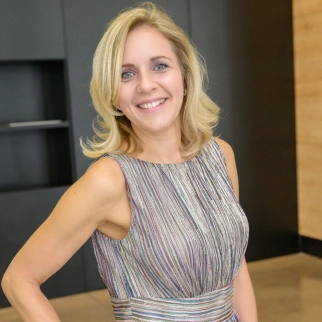Dóra's role in promoting female leadership
Dóra's role in promoting female leadership
Dóra Nyerges
HR Director
Forvis Mazars in Hungary
Dóra, can you tell us about your time at Forvis Mazars?
I’ve been working at Forvis Mazars for over 17 years now, leading the firm’s HR department. When I joined the firm, there were only 40 people at our office, but now we’ve grown to 190, and I’m proud to have played an active role in our development. At Forvis Mazars in Hungary, we’ve made a name for ourselves being an innovative office.
You’ve recently developed a women’s leadership campaign and we’d love to know about the programme, can you give us an overview?
At Forvis Mazars in Hungary, we embrace the firm’s global corporate sustainability strategy, which is well known under the #MazarsForGood banner. Our local HR team plays an important role in creating a corporate sustainability action plan aligned with the firm’s global recommendations and objectives, including challenges focused on educating our colleagues.
Diversity and inclusion are top priorities for the firm, and we wanted to spotlight their importance through a local lens. In 2022, we launched an initiative to promote female leadership across Forvis Mazars in Hungary. Our videos featured female leaders sharing their experience and advice to young women.
For this project we wanted to show that diversity was not only about gender, but about different ages, leadership styles and professional backgrounds. We selected three leaders from different service lines: one from audit, one from accounting and one from tax, to highlight their unique characteristics and stories.
All three leaders started at the company in junior level positions and have risen to the senior level - and in December 2022, one of them was even promoted to become a partner. To showcase the full picture, each of them also selected colleagues to comment on their leadership styles and share their experiences working together.
Finally, in our fourth video, we selected seven young professionals and asked them about why they like working at Forvis Mazars. Each of them shared what they have gotten out of their experience at the firm, and it was a great success because it helped tighten our sense of community by featuring young women from all different paths.
Why is this project important for you?
As an HR leader, I think it’s really important to leverage the powerful stories of women leaders across all levels. In this project, each of the seven women who participated came from different service lines and educational backgrounds which demonstrates the versatility of the profiles and personalities of our talent.
Beyond the number of likes and shares that this campaign has earned on Facebook, we have also received spontaneous feedback from external commentors. One person said,
“I just want to congratulate your management and the people working at Forvis Mazars. I watched all the videos published on your career site and I was really impressed and moved by the sense of community. It seems like a great environment where support and mutual respect is intangible.”
Feedback like this goes to show how important it is to share the achievements of women within the wider sphere, and it helps to keep Forvis Mazars recognised as a diverse and inclusive workplace where each individual has the opportunity to grow and develop. I look forward to doing more work in this area in the future.
How did Forvis Mazars in Hungary decide on the topic of gender diversity as a priority?
Last year was the beginning of our corporate sustainability journey, which focuses on three pillars: environment, community, and diversity.
We’ve made a lot of progress on the diversity front, especially in gender balance. Currently, in terms of manager level or above, 23 out of the 53 managers are women and our recruitment ratio of women has also grown from 59% to 65%, so it’s clear we are steadily attracting more female talent. We are very proud of this and continue to work on developing more women leaders within the company.
Now we are trying to continue the movement and find creative ways to do so. This year we created the ‘WoMentor programme’, which is a women-only mentoring system (mentors and mentees). We are also planning an activation around March 2023 to leverage International Women’s Day, and we are in the process of planning what that will look like.
At the CEE regional level, together with Austria, Switzerland and Germany, we are organising a women’s development day in March and one of our role models will be present as a lecturer and other members of the programme will also join as participants.
Throughout the year, we also try to show appreciation through small gestures, such as offering a nice package to expecting mothers as they go on maternity leave. We are equally concerned with welcoming back these mothers and reintegrating them into work life by offering flexible working time, home office and more.

